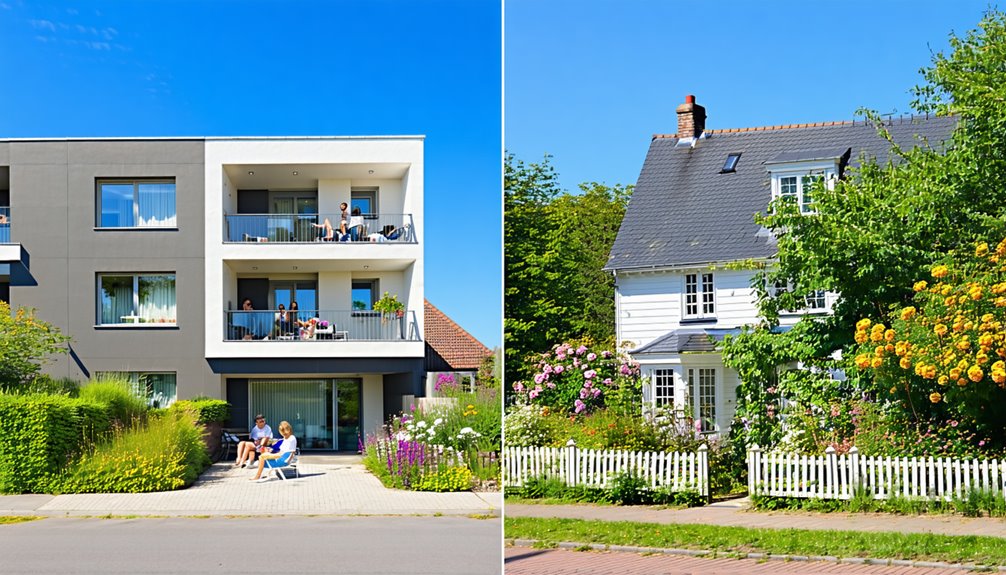
This post was last modified on August 23, 2025.
If you’re thinking about buying property as an investment, knowing the difference between leasehold and freehold ownership can make or break your financial success. With freehold, you gain full ownership, while leasehold means you’re fundamentally renting the property for a set period, often with conditions attached. This distinction can affect not just your lifestyle, but also your financial future. So, which option might align better with your goals? Let us explore the nuances of each type and what they could mean for your investment strategy.
Key Definitions
When exploring property ownership, it’s important to understand the key definitions of leasehold and freehold. With leasehold ownership, you’re buying the right to live in a property for a set period – usually 99 to 125 years – but you don’t own the land underneath. This arrangement is governed by a lease agreement that specifies terms, conditions, ground rent, and maintenance responsibilities.
As a leaseholder, your rights include using and occupying the property throughout the lease term. However, you also face obligations, such as paying rent and maintaining the interior of the property. The freeholder generally handles structural and common areas, creating a shared maintenance responsibility.
It’s important to be aware of potential restrictions that may limit how you can modify or use the property. Leaseholder rights also extend to lease renewal options, which can be negotiated at the end of the lease term. Additionally, understanding title issues associated with leasehold properties can help you navigate potential complications that may arise during ownership.
However, be mindful that as the lease nears its end, property value may decrease, impacting your investment. Getting familiar with these terms will help you avoid costly mistakes when dealing with leasehold properties.
Ownership and Control
When you own a freehold property, you possess both the building and the land it sits on, granting you complete property rights. This means you have the freedom to modify your home without seeking permission, aside from local planning regulations.
In contrast, leasehold ownership only grants you rights over the property for a specified term, while the land remains under the control of the freeholder. Ownership implications are significant here; leaseholders often face restrictions on modifications and must seek permission for many changes.
Additionally, freehold owners bear full responsibility for maintenance and repairs, while leaseholders typically share these burdens with the freeholder for communal areas.
When it comes to transferring ownership, freeholds can be sold without restrictions, unlike leaseholds, which are bound by lease terms. The fixed lease term and potential for expiration can impact your long-term property rights, making it important to understand how these factors affect your ownership experience.
Ultimately, knowing these differences will help you make an informed decision when choosing between leasehold and freehold properties. Deed restrictions can additionally impact the use and modification of properties, emphasizing the need for thorough understanding and compliance.
Financial Considerations
Financial considerations play a significant role in deciding between leasehold and freehold properties. When you evaluate your investment strategies, the initial costs are key. Leasehold properties usually come with a lower purchase price, making them attractive for buyers on a budget. In contrast, freehold properties require a higher upfront investment due to land ownership, which can strain your finances initially.
Ongoing expenses also differ markedly. Leasehold properties involve ground rent and service charges, which can increase over time, complicating your cost analysis. Freehold owners don’t face these charges but must budget for unpredictable maintenance and repair costs.
When it comes to long-term value, freehold properties typically appreciate and are easier to sell, giving you more stability and security. Conversely, leasehold properties can depreciate, especially as the lease term shortens. Extending a lease can be costly and cumbersome, affecting your financial plans. Additionally, understanding the potential for financial rewards in real estate can influence your investment decision.
Ultimately, if you’re considering a long-term residence or investment, freehold properties may offer better returns. In contrast, leasehold properties might suit short-term living situations or high-demand rental markets, but they come with ongoing financial obligations that could limit your future plans.
For aspiring real estate agents in California, understanding leasehold versus freehold properties becomes even more important when you’re helping clients make informed decisions. California’s diverse real estate market includes both types of ownership, particularly in areas like planned communities, condominiums, and certain residential developments. As a licensed agent, you’ll need to explain these concepts clearly to buyers, help them understand the long-term financial implications, and guide them through the specific disclosure requirements that California law mandates for leasehold properties. This knowledge will set you apart from other agents and build trust with clients who rely on your expertise to protect their investment.
Legal Aspects
Beyond the agent’s perspective, how do the legal frameworks surrounding leasehold and freehold properties influence your ownership experience? These legal differences matter because they determine what rights you have, what you’re responsible for, and what problems might come up later.
In freehold ownership, you enjoy complete control with no time limits on ownership, allowing you to make alterations freely. Conversely, leasehold ownership comes with defined legal responsibilities outlined in the lease agreement. These include:
- Maintenance Responsibilities: Freeholders manage all repairs, while leaseholders may face shared responsibilities or service charges.
- Property Taxes: Freeholders pay property taxes, whereas leaseholders might share these costs based on their lease terms.
- Dispute Resolution: Leaseholders often navigate disputes over rent, repairs, or lease extensions, which can escalate to legal proceedings if not addressed.
Moreover, leaseholders must consider the complexities of lease renewal or extension, often incurring additional costs. Understanding these legal aspects helps you navigate your property ownership more effectively and prepares you for potential disputes. Additionally, being aware of your agent’s fiduciary duties ensures that you receive proper representation throughout the process.
Whether you’re a freeholder or leaseholder, being aware of your legal responsibilities guarantees you maintain a clear understanding of your rights and obligations.
Advantages and Disadvantages
Before choosing between leasehold and freehold properties, think about which option fits better with how you live and what you want financially.
Leasehold properties offer several leasehold benefits, such as affordability and lower upfront costs, making them attractive for first-time buyers or those with short-term housing needs. You’ll also enjoy lower maintenance responsibilities, as landlords typically handle repairs and upkeep, along with access to shared amenities.
However, leasehold ownership comes with notable disadvantages, including limited control over alterations and potentially decreasing property value as the lease shortens. Lease renewal costs can also be significant, alongside annual charges that may rise over time.
On the other hand, freehold properties provide complete ownership and control, allowing you to modify your home freely and avoid lease renewal costs. They often appreciate in value, contributing to long-term financial stability, especially in a high demand market like California.
However, freehold drawbacks include higher initial investments and the full burden of maintenance responsibilities and property taxes. Weighing these factors carefully can help you make an informed decision that suits your needs.
Frequently Asked Questions
Can Leasehold Properties Be Converted to Freehold?
Yes, you can convert leasehold properties to freehold. This process allows you to enjoy freehold advantages, like absolute ownership and increased property value, while still benefiting from leasehold perks during the changeover.
How Does Leasehold Impact Mortgage Options?
Leasehold properties impose mortgage restrictions due to shorter lease terms. Lenders often prefer leases with at least 70 years left, which can limit your options and increase costs, ultimately affecting your financial flexibility and investment potential.
What Happens if the Leaseholder Dies?
If the leaseholder dies, inheritance rights transfer the lease obligations to the estate. You’ll need to evaluate lease extensions and guarantee the estate manages ongoing payments until formal lease termination occurs, following legal protocols.
Are Pets Allowed in Leasehold Properties?
In leasehold properties, pet policies vary significantly based on lease agreements. You’ll often need written permission to keep pets, and restrictions can lead to legal action if violated. Always review your lease for specific terms.
How Is Ground Rent Calculated and Increased?
Ground rent’s calculated based on your lease agreement, typically as a fixed amount or percentage of the property’s value. Increases often occur through rent reviews, inflation adjustments, or predetermined clauses outlined in your lease.




